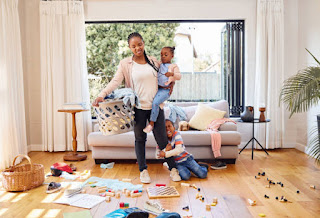Set Clear Expectations: Begin by explaining why keeping their room clean and organized is important. Mention benefits like finding things easily, creating a pleasant space, and being responsible.
Use simple language that they can
understand and relate to.
Make It a Fun Activity: Turn cleaning into a game or a challenge. For example, see who can pick up the most toys the fastest.
Play their favorite music while
cleaning to make it enjoyable.
Break It Down: Show them how to break the cleaning process into small, manageable tasks. For example, they could first pick up toys, then make the bed, and so on.
Provide a checklist with pictures
or simple words to help them remember the steps.
Lead by Example: Children often mimic what they see. Clean your own space alongside them to demonstrate the process and make it a family activity.
Provide the Right Tools: Ensure they have age-appropriate cleaning supplies, such as a small broom, dustpan, cloth, and a designated place to put their toys and belongings.
Teach them how to use these tools
safely.
Give Specific Instructions: Explain how to tidy up different areas of their room. For instance, show them how to make their bed neatly and how to arrange toys on shelves.
Sort and Declutter: Teach them to sort toys and items into categories (e.g., dolls, cars, books). Explain the concept of keeping what they use and donating or storing what they don't.
Use Timers: Set a timer for short cleaning sessions. Encourage them to race against the clock to complete tasks. This can make cleaning feel less overwhelming.
Offer Rewards and Praise: Provide positive reinforcement for a job well done. You can use a sticker chart, small rewards, or simply praise and hugs.
Highlight how proud you are of
their efforts.
Create a Routine: Establish a daily or weekly cleaning routine. Consistency is key to forming good habits.
Make sure they understand that
cleaning up is part of their daily responsibilities.
Organizational Tips: Teach them about the importance of having a designated place for each item. Use clear labels or pictures to help them remember where things belong.
Encourage them to put items back after using them.
Lead to Independence: As they become more skilled, gradually let them take more responsibility for their room. This empowers them and fosters independence.
Be Patient: Understand that children may not achieve perfection immediately. Be patient and offer guidance without frustration.
Encourage them to learn from
their mistakes.
Regular Check-Ins: Schedule regular room inspections together. This keeps them accountable and helps maintain cleanliness and organization.
Celebrate Achievements: Celebrate milestones and progress, whether it's a clean room, a well-organized closet, or mastering a new cleaning skill.
Remember that teaching kids about
cleaning and organization is an ongoing process. Be consistent, patient, and
supportive, and gradually they will develop valuable skills for keeping their
rooms and spaces neat and organized.
Read More:
1.) The Effect of A Dirty Bedroom.
https://www.thecleanbedroom.com/mattress-blog/the-effects-of-a-dirty-bedroom
2.) 9 New Rules for Decluttering a kid's room -and keeping it that way.
https://www.goodhousekeeping.com/home/organizing/tips/a36448/rules-for-decluttering-a-kids-room/
📍 Shop my Handmade Scrunchies


No comments:
Post a Comment